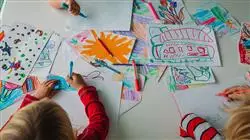University certificate
Accreditation/Membership

The world's largest faculty of education”
Introduction to the Program
A comprehensive and 100% online program, exclusive to TECH, with an international perspective backed by our membership in the Association for Teacher Education in Europe”

Didactics and Teaching Practice in Pre-School Education is a key area for the early development of children, as it lays the foundation for their learning and emotional growth. A deep understanding of current pedagogical methodologies, as well as the use of digital tools in the classroom, are essential to face the educational challenges of the 21st century. For this reason, it is of utmost importance that teachers refine their skills in a constantly evolving environment.
In response to this pressing need for continuous updating, TECH presents this Advanced master’s degree in Didactics and Teaching Practice in Pre-School Education. Through an innovative syllabus, this program will provide specialists with the necessary competencies to apply effective pedagogical approaches tailored to the needs of each child. Here, topics such as psychopedagogy, the use of educational technologies, classroom management, and inclusive strategies to address diversity in educational settings will be explored in depth. In this way, the professional growth of graduates will be enhanced, as they will be ready to access new opportunities and improve their professional profile.
TECH will offer this university qualification through a 100% online format, allowing students to study at their own pace. Additionally, this will be complemented by the Relearning method, which reinforces the understanding of key concepts through repetition, ensuring effective assimilation of the content. Ultimately, students will benefit from constant access to downloadable study materials, available 24/7.
On the other hand, since TECH is a member of the Association for Teacher Education in Europe (ATEE), professionals will gain access to specialized academic journals and discounts on publications. Moreover, they will be able to attend webinars or conferences free of charge and access language support. They will also be included in the ATEE consultancy database, thereby expanding their professional network and access to new opportunities.
Thanks to the online format, you will train at your own pace and without interruptions to your professional life. What are you waiting for to join the world’s largest online university, according to Forbes?”
This Advanced master’s degree in Didactics and Teaching Practice in Pre-School Education contains the most complete and up-to-date educational program on the market. The most important features include:
- The development of practical cases presented by experts in Didactics and Education
- The graphic, schematic, and practical contents with which they are created, provide scientific and practical information on the disciplines that are essential for professional practice
- Practical exercises where the self-assessment process can be carried out to improve learning
- Special focus on innovative methodologies in Didactics and Teaching Practice in Pre-School Education
- Theoretical lessons, questions to the expert, debate forums on controversial topics, and individual reflection assignments
- Content that is accessible from any fixed or portable device with an Internet connection
Prepare your path to educational success with this specialized Advanced master’s degree. Make the decision and take your career to the next level!”
The multimedia content, developed with the latest educational technology, will provide the professional with situated and contextual learning, i.e., a simulated environment that will provide an immersive educational experience designed to prepare students for real-life situations.
This program is designed around Problem-Based Learning, whereby students must try to solve the different professional practice situations that arise during the academic year. For this purpose, professionals will be assisted by an innovative interactive video system created by renowned and experienced experts.
Only at TECH will you boost your teaching career with the best materials, the most innovative methodology, and the most dynamic and intuitive platform. Enroll now!”

With an online methodology tailored to your needs, this Postgraduate Certificate will provide you with key tools for effective pre-school education. Take advantage of this opportunity and enroll now!”
Why study at TECH?
TECH is the world’s largest online university. With an impressive catalog of more than 14,000 university programs available in 11 languages, it is positioned as a leader in employability, with a 99% job placement rate. In addition, it relies on an enormous faculty of more than 6,000 professors of the highest international renown.

Study at the world's largest online university and guarantee your professional success. The future starts at TECH”
The world’s best online university according to FORBES
The prestigious Forbes magazine, specialized in business and finance, has highlighted TECH as “the world's best online university” This is what they have recently stated in an article in their digital edition in which they echo the success story of this institution, “thanks to the academic offer it provides, the selection of its teaching staff, and an innovative learning method aimed at educating the professionals of the future”
A revolutionary study method, a cutting-edge faculty and a practical focus: the key to TECH's success.
The most complete study plans on the university scene
TECH offers the most complete study plans on the university scene, with syllabuses that cover fundamental concepts and, at the same time, the main scientific advances in their specific scientific areas. In addition, these programs are continuously being updated to guarantee students the academic vanguard and the most in-demand professional skills. In this way, the university's qualifications provide its graduates with a significant advantage to propel their careers to success.
TECH offers the most comprehensive and intensive study plans on the current university scene.
A world-class teaching staff
TECH's teaching staff is made up of more than 6,000 professors with the highest international recognition. Professors, researchers and top executives of multinational companies, including Isaiah Covington, performance coach of the Boston Celtics; Magda Romanska, principal investigator at Harvard MetaLAB; Ignacio Wistumba, chairman of the department of translational molecular pathology at MD Anderson Cancer Center; and D.W. Pine, creative director of TIME magazine, among others.
Internationally renowned experts, specialized in different branches of Health, Technology, Communication and Business, form part of the TECH faculty.
A unique learning method
TECH is the first university to use Relearning in all its programs. It is the best online learning methodology, accredited with international teaching quality certifications, provided by prestigious educational agencies. In addition, this disruptive educational model is complemented with the “Case Method”, thereby setting up a unique online teaching strategy. Innovative teaching resources are also implemented, including detailed videos, infographics and interactive summaries.
TECH combines Relearning and the Case Method in all its university programs to guarantee excellent theoretical and practical learning, studying whenever and wherever you want.
The world's largest online university
TECH is the world’s largest online university. We are the largest educational institution, with the best and widest online educational catalog, one hundred percent online and covering the vast majority of areas of knowledge. We offer a large selection of our own degrees and accredited online undergraduate and postgraduate degrees. In total, more than 14,000 university degrees, in eleven different languages, make us the largest educational largest in the world.
TECH has the world's most extensive catalog of academic and official programs, available in more than 11 languages.
Google Premier Partner
The American technology giant has awarded TECH the Google Google Premier Partner badge. This award, which is only available to 3% of the world's companies, highlights the efficient, flexible and tailored experience that this university provides to students. The recognition as a Google Premier Partner not only accredits the maximum rigor, performance and investment in TECH's digital infrastructures, but also places this university as one of the world's leading technology companies.
Google has positioned TECH in the top 3% of the world's most important technology companies by awarding it its Google Premier Partner badge.
The official online university of the NBA
TECH is the official online university of the NBA. Thanks to our agreement with the biggest league in basketball, we offer our students exclusive university programs, as well as a wide variety of educational resources focused on the business of the league and other areas of the sports industry. Each program is made up of a uniquely designed syllabus and features exceptional guest hosts: professionals with a distinguished sports background who will offer their expertise on the most relevant topics.
TECH has been selected by the NBA, the world's top basketball league, as its official online university.
The top-rated university by its students
Students have positioned TECH as the world's top-rated university on the main review websites, with a highest rating of 4.9 out of 5, obtained from more than 1,000 reviews. These results consolidate TECH as the benchmark university institution at an international level, reflecting the excellence and positive impact of its educational model.” reflecting the excellence and positive impact of its educational model.”
TECH is the world’s top-rated university by its students.
Leaders in employability
TECH has managed to become the leading university in employability. 99% of its students obtain jobs in the academic field they have studied, within one year of completing any of the university's programs. A similar number achieve immediate career enhancement. All this thanks to a study methodology that bases its effectiveness on the acquisition of practical skills, which are absolutely necessary for professional development.
99% of TECH graduates find a job within a year of completing their studies.
Advanced Master's Degree in Didactics and Teaching Practice in Pre-School Education
The school stage of a child represents a key point for their physical, social, motor, and intellectual development. It is during this phase that cognitive growth, personality, socialization, and perception of the environment begin to shape the student's patterns, allowing them to adapt to the classroom and interact with classmates and teachers. However, not all students behave or learn in the same way, which calls for the use of teaching tactics and methodologies tailored to each school group. This is why TECH Global University has designed a Advanced Master's Degree in Didactics and Teaching Practice in Pre-School Education, through which you will develop high-level competencies for teaching via a 100% virtual format, free from fixed schedules. The program lasts for two years and includes continuous guidance from experts who will instruct you on aspects such as personalized training, educational legislation in the organization of educational institutions, and general didactics in literacy, Spanish language, mathematics, natural and social sciences, among others.
Specialize in didactics and teaching practice in pre-school education
If one of your professional goals is to enhance the practice of your profession, TECH offers a program that brings together all the necessary elements to achieve this. The structure of the graduate program has been designed using the latest educational technologies, and the syllabus includes a wide range of fundamental concepts in the area. Here, you will have access to lessons supported by innovative academic material, complemented by a methodology focused on online learning. Throughout the course, you will cover topics ranging from musical and instrumental didactics, "educational resilience," and information and communication technologies applied to the classroom, to the creativity of plastic expression and the anthropological, philosophical, and psychological foundations of education. Lastly, you will study best teaching practices in family and social contexts to generate habitual behaviors inside and outside the classroom. Want to know more? Make your decision and enroll now.







